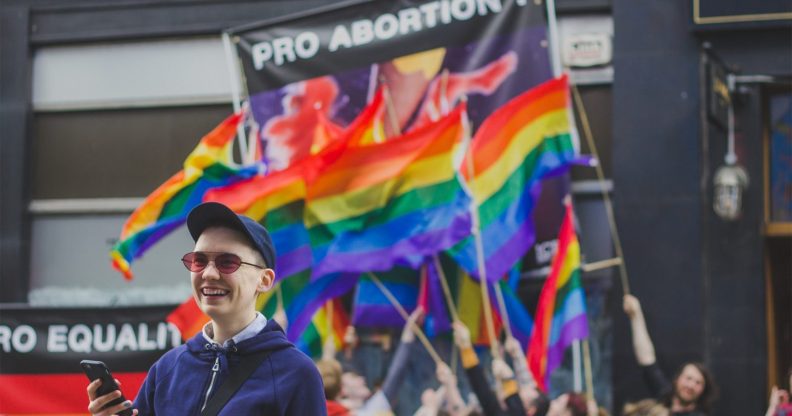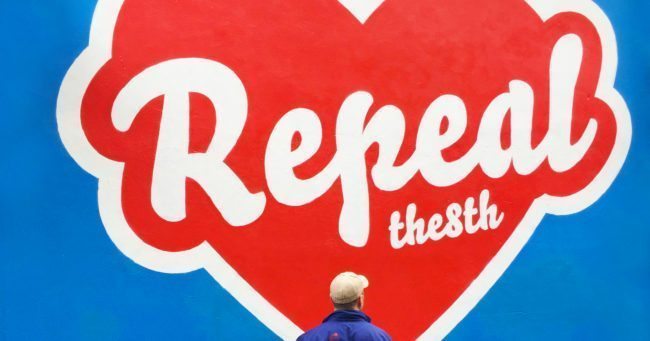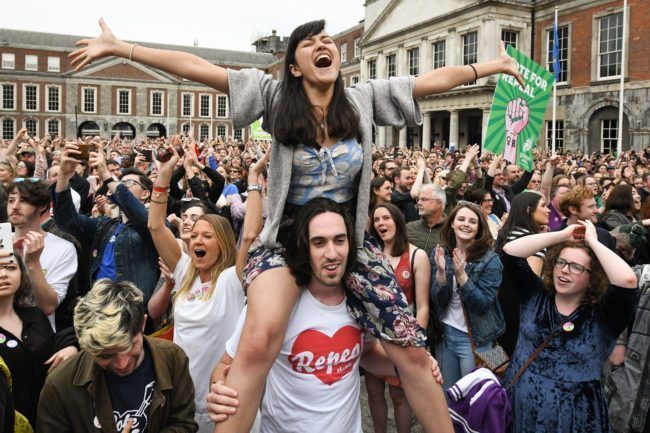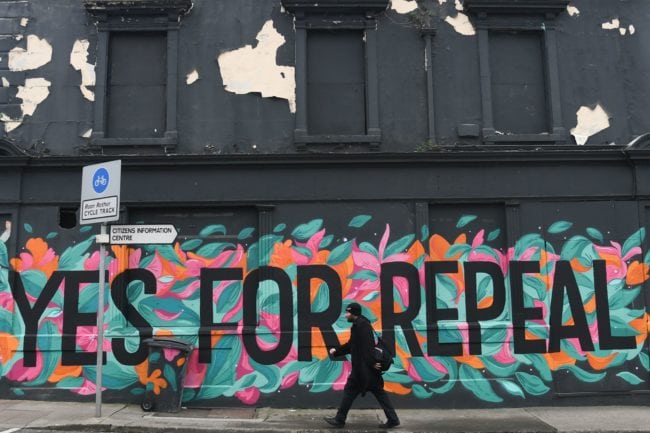LGBTQ campaigners say trans men in Ireland ‘will be denied abortion access’

RQR activists counter protesting against anti-abortion group ICBR outside The George, a gay bar in Dublin. (RQR)
LGBTQ campaigners are arguing that trans men and non-binary arlieople will be “denied abortion access” when the medical procedure is legalised in Ireland following its historic referendum.
Radical Queers Resist (RQR), which had been covering up graphic anti-abortion images across Dublin with pride flags, has said that the proposed abortion legislation laws will exclude trans men and non-binary people.
“The proposed legislation for termination of pregnancy in Ireland will only allow women to access abortion,” RQR told PinkNews.
“Thus, trans men in Ireland will be denied abortion access,” the group added. “The case will be the same for non-binary people.”
The group highlighted a tweet by Fergus Ryan, a senior lecturer in the Department of Law at Maynooth University, in which the academic explains how, under Section 18 of the Gender Recognition Act 2015, trans men with a gender recognition certificate are legally recognised as men.

Repeal the 8th (Getty)
However, Ryan adds that the proposed abortion legislation “will allow terminations only for women, defined as female persons of any age.”
PinkNews has contacted Ireland’s Department of Health for comment.
RQR, alongside other LGBTQ activists groups, is urging politicians in Ireland to include gender-neutral language in new abortion legislation.
“We are urging all people of Ireland to push their parliamentary representatives to fight for trans inclusive language to be included in the legislation to regulate abortions is Ireland,” RQR said.
“It’s time Ireland became aware of its trans communities’ call and demand for healthcare, and that includes abortion access. Some men and non-binary folk can become pregnant, and therefore need access to abortion services.”
Ireland’s referendum on Friday resulted in a landslide win for the ‘Yes’ campaign, with 66.4 percent of voters opting to reform the Republic of Ireland’s harsh abortion laws.

(ferguswryan/Twitter)
RQR has said it will be be protesting at the Department of Health in Dublin on 1 June for the government to use “trans inclusive” language in abortion laws – and also for the services to be free and to have no wait periods.
Meanwhile, Noah Halpin, founder of the This Is Me – Transgender Healthcare Campaign, told Irish magazine GCN: “Despite what some may believe, men can become pregnant too.
“There are tens of thousands of transgender men and non-binary people in Ireland who can conceive, and when speaking about reproductive healthcare, we must always be mindful of that.”

Supporters celebrate at Dublin Castle following the result Irish referendum result on the 8th amendment (Jeff J Mitchell/Getty Images)
Halpin said it was “imperative” that the upcoming legislation contained inclusive language to ensure transgender and non-binary people were not hindered by “legal barriers” when accessing abortion.
“By using the term pregnant people in new legislation, as well as protecting women, we are also protecting and respecting all gender identities should a crisis pregnancy occur,” Halpin said.
Transgender Equality Network Ireland (TENI) tweeted: “To help clarify with some of the questions we’re seeing in our mentions: Trans men & non-binary people can get pregnant. The proposed legislation does not include them.
“Legislation will obviously overwhelmingly affect women & girls, but trans inclusion doesn’t take away their rights!”
Bella Fitzpatrick, the managing director at Ireland’s LGBT+ charity Shout Out, also commented on Twitter: “If you’ve been passionate about Repeal but have a problem with the law being trans inclusive in its language please just ask yourself why that might be.
“You can legally be a man in Ireland & need an abortion. Laws should reflect that & include NB [non-binary] people too.”
Campaigner Mara Clarke, the founder of the charity Abortion Support Network, wrote ahead of the referendum: “We believe that individual women (or people, as we know a handful of our clients have identified as trans men) are best placed to decide whether they are ready and able to parent now or ever.
“We also know the currently law has far more devastating impact on poor and marginalised women. We also know that women desperate not to be pregnant will do desperate things, including risking criminal prosecution by taking safe but illegal early medical abortion pills or by taking dangerous action to self-terminate.”

A man walks in front of a pro-choice mural urging a yes vote in the referendum to repeal the eighth amendment of the Irish constitution (Getty)
In 2015, Ireland passed the Gender Recognition Act to allow people to legally change their gender without needing medical intervention or assessment by the state.
In the UK, citizens require a medical diagnosis of gender dysphoria. Many people choose not to do so, as it can be a lengthy and invasive process.
This week, Ireland’s Prime Minister Leo Varadkar said a new abortion law would be in place by the end of the year.

